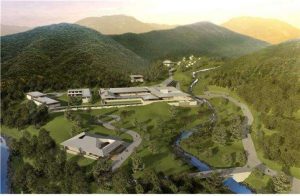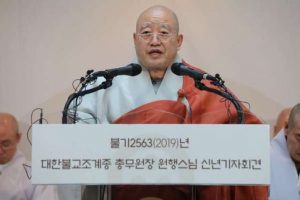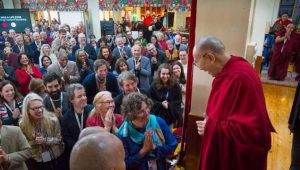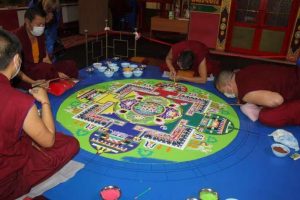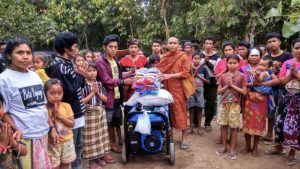
It is a very common and reasonable question for those coming to Pure Land Buddhism for the first time to ask: “Who is Amida Buddha?” The Infinite Life Sutra tells us that Amida Buddha had been a Bodhisattva in a previous life, Dharmakara. Many are interested in the historicity of this Buddha, trying to put him in a time frame with an evidence based story. If we try to approach Amida Buddha this way we will either end up very disappointed or terribly confused. Asking who Amida Buddha was is simply the wrong question.
One of the road blocks for many coming to Pure Land Buddhism is the seemingly surreal language which the Buddha uses to describe Amida Buddha and the Pure Land. This is the language of mythology. Often we write off mythology as something that is not “real” or simply nice little stories. Myth is not a fairy tale. Myth is a language. It is the language of the deep subconscious and is the connecting medium by which or unconscious world interacts with the outer conscious mind and the world. Myth is the language that describes realities that cannot be properly described by normal daily human language. Myth becomes the bridge between two cultures and as we cross that bridge we enter a world which we have forgotten. It is not entirely a new world but a world which has been hidden from our view by the many layers of “self” that we have taken upon ourselves as a means of providing self-identity and meaning. We obtain meaning through the eyes of the “self”. The meaning we so often see or understand about life leaves us confused or in despair and thus the need to chase those things that seem to quell the heat and flames of the despair, things that take us further away from the true meaning of life.

In the Infinite Life Sutra Amida Makes 48 Vows. In his 18th Vow he vows: “If, when I attain Buddhahood, sentient beings in the lands of the ten quarters who sincerely and joyfully entrust themselves to me, desire to be born in my land, and call my Name, even ten times, should not be born there, may I not attain perfect Enlightenment”. For Pure Land Buddhists this points to the need for the continual practice of reciting the Buddha’s name in oral recitation, chanting or meditation. This vow speaks of liberation. It speaks of being born into the Pure Land. In other words, it speaks of attaining a shift of conscious awareness from the world of illusion created by “self” to a consciousness of ultimate happiness and peace.
The Vow further awakens us to an aspiration. This is the aspiration to find true freedom from struggle and suffering not only for ourselves but for all beings. It awakens in us the aspiration to discover who we really are and what we really want deep, deep down inside of us. I would lose count of the number of times people have asked me on meditation retreats : “What is the purpose of my life?” or “How can I find meaning in my work and life?” These are real questions that confront most people at some stage in their life. “Who am I?” These are the burning questions the answers to which are so often drowned out by the noise and clamour of the desires based on material possessions, fleeting relationships which momentarily quench the passions and an ever increasing desire for decorated irrelevancies.
When we are able to take a deep breath with courage and come face to face with these questions, once we begin to still the mind and passions in meditation, it is then that Amida Buddha begins to come to the surface from our inner depths. It is in that moment that we no longer have the need to ask “Who is Amida Buddha” because in that moment we have recognized him – we have remembered him as a long lost friend. Samadhi becomes like an experience of seeing a long lost close friend amidst a crowd of faces in a busy down town shopping mall or subway, shouting out and with joy running to each other and come face to face in a warm embrace. It is in that moment we discover our own true nature which transcends all banality and the world of despair we had created for ourselves. In this moment we are truly free.
This freedom allows us to live a life of purpose and our aspirations are realized. Amida becomes the bridge between two worlds. I am told that here in Mainland China there were many years ago places along the Yangtze River where people would try to cross the river to reach the town or village on the other side. However the Yangtze River is a fast flowing and power river with very strong currents. Many people lost their lives in attempts to cross. Life is like that too. Sometimes the currents are so strong that we can easily drown in our attempts to cross over to a world of peace and beauty. Yesterday I spoke at a convention in Shanghai to a very large audience. One young man who seemed genuine in his desire to live a worthwhile and meaning life shared of the despair he often has in trying to succeed against many social pressures and obstacles. Today large bridges span the Yangtze river enabling easy access to the other side. As Pure Land practitioners we have Amida Buddha as that bridge.
Once we have discovered Amida as our true nature it is then our true and authentic inner nature which becomes the bridge to Pure Land.The Great Vow speaks of calling on the name of Amida Buddha. Traditionally in Pure land Buddhism this means orally reciting the name of Amida Buddha. Many misunderstand this practice as just boring repetition. This is far from the truth. The words Namo Amituo Fo (Praise to Amida Buddha) are a mantra. Mantras are used widely throughout many schools of Buddhism. It is a mantra that when continually repeated begins to seep into the unconscious mind and takes effect. Karmic obstructions over countless lifetimes prevent us from realizing our true nature. These are the karmic obstructions of wicked or evil thoughts and actions stand in the way like road blocks making it difficult to gain purity of consciousness. Once they are removed then we can find it infinitely easier to walk the road towards out true nature. The Great Vow becomes our road to true freedom.


